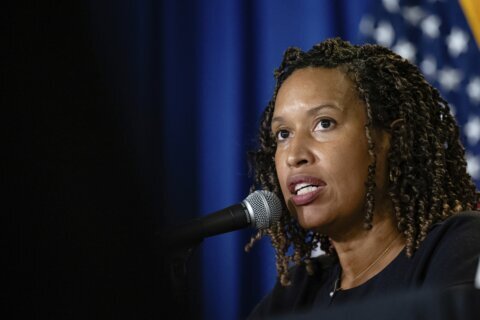Nearly five years ago, 10-year-old Makiyah Wilson was gunned down after walking back from an ice cream truck in Northeast D.C. Now, the three-month trial of six men charged in her murder is wrapping up, with the jury expected to begin deliberations Tuesday.
In a silent courtroom, Wilson’s grandmother Pandora Wilson gasped, caught off guard when she realized she was looking at a photo of her granddaughter’s cleaned chest wound from the rifle round that prosecutors said “eviscerated her heart.”
The photo was part of a two-day presentation wrapping up the prosecution’s evidence against the six men charged in connection with the July 2018 shooting: Quentin Michals, Marquell Cobbs, Isaiah Murchison, Gregory Taylor, Darrise Jeffers and Qujuan Thomas.
All six men are all facing charges in the shooting that killed the girl and wounded four others, including her older sister Nyjhay Lewis, who was 18 at the time. Each defendant has two attorneys, and in an uncommon situation at DC Superior Court, they are all being tried together, in the same courtroom. The second group of people charged in connection with the shooting is set to have their trial begin on May 30.
The defendants, who have nicknames like DF Cutta, Gizzle, Stello, Moneygam, and Q, are all from the Wellington Park neighborhood in Southeast D.C., which prosecutors say is a critical reason the retaliatory shooting happened. Prosecutors have said the spray of some 50 bullets in the courtyard of Clay Terrace was motivated by perceived “beefs” between neighborhood gangs.
“It has been five years … it is time now that each of them owns up and reaches Judgement Day for what they’ve done. It’s time to hold them accountable for nonsense on the internet rising to this level of violence,” prosecutor Laura Bach told jurors.
However, in presenting their closing arguments to the jury, attorneys for two of the defendants leaned into the prosecution’s lack of DNA evidence linking the defendants to the shooting.
“Isaiah didn’t get in that car and the government can’t prove that he got in that car. Isaiah did not go to Clay Terrace that day,” said Isaiah Murchison’s attorney, Elizabeth Weller.
Weller and Errin Scialpi, who represents defendant Quentin Michals, said the voluminous circumstantial evidence presented by U.S. attorneys tracking the online slights and conversations between crew members, as well as videos of the group singing violent rap lyrics, doesn’t amount to proof beyond a reasonable doubt that they participated in a murder.
“Do not trust their interpretation,” Scialpi told the jurors of the prosecution’s presentation of the evidence.
The jury is expected to get the case for deliberations on Tuesday.








